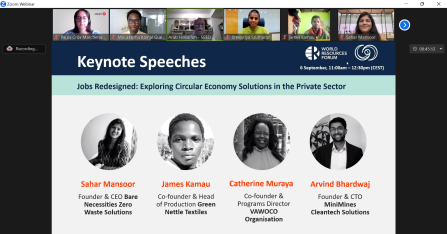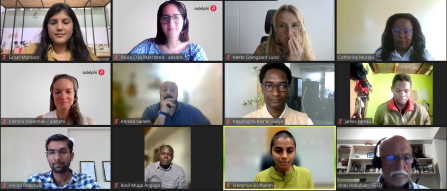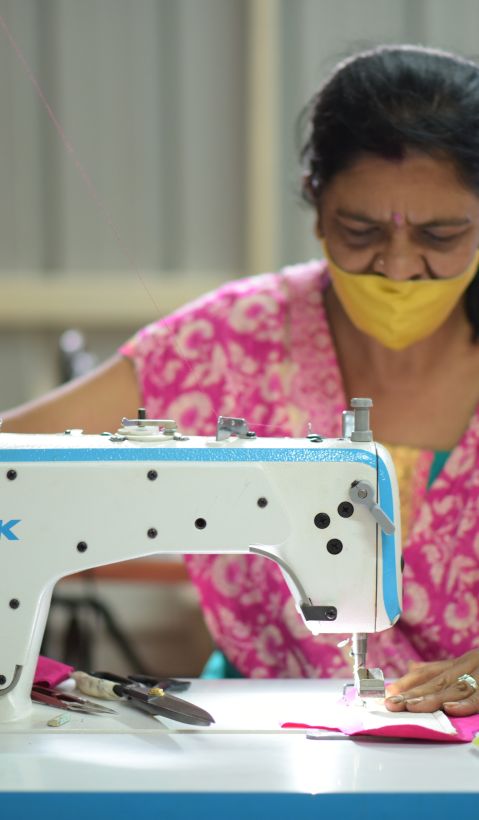Spotlight on Circular Innovation: SMEs Leading the Way at CEC’s WRF23 Side Event
| Date |
Date
|
As part of the World Resources Forum 2023, the Circular Economy Catalyst and SEED, hosted by adelphi, organised a side event that put the spotlight on successful circular business models from small- and medium-sized enterprises (SMEs). These innovative entrepreneurs not only showcased their innovative solutions but also demonstrated how they are actively contributing to the global transition towards a more inclusive and circular economy, with a strong focus on job creation.
The side event at WRF23 was marked by engaged participants and thought-provoking discussions. As the global community continues to deal with environmental challenges, events like these offer a glimpse into the future of green jobs and the circular economy, and the positive impact it can have on society and the planet.
The event featured presentations from four awardees of the Circular Economy Awards 2023, hailing from India and Kenya. The entrepreneurs from Bare Necessities Zero Waste Solutions, Green Nettle Textiles, VAWOCO Organisation, and MiniMines Cleantech Solutions took centre stage to talk about their innovative circular business models.

Circular Economy Leaders
These forward-thinking entrepreneurs provided insights into their strategies for tackling environmental and economic challenges in their respective regions. They emphasised the importance of adopting circular approaches to resource management, waste reduction, and sustainability. Their efforts are setting the stage for positive change on a global scale.
The event counted with diverse speakers, including Ahmed Sameh, Programme Manager at the IKEA Foundation, and Moustapha Kamal Gueye, Director of the Priority Action Programme on Just Transitions at the International Labour Organisation (ILO). Their opening remarks set the stage for an engaging discussion.
Sahar Mansoor, Founder & CEO of Bare Necessities Zero Waste Solutions, Catherine Muraya, Co-founder & Programs Director of VAWOCO Organisation, James Kamau, Co-founder & Head of Production at Green Nettle Textiles, and Arvind Bhardwaj, Founder & CTO of MiniMines Cleantech Solutions, presented keynote speeches, outlining their journey towards creating sustainable businesses and the impact they have on the environment and society.
Sreepriya Sridharan, Strategic Alliances and Partnerships Manager at Karo Sambhav, Basil Muga Angaga, CSO-Chief Sustainability Officer of the County Government of Mombasa, and Mette Grangaard Lund, Technical Specialist in Green Jobs at ILO, also contributed valuable insights during the event.

Exploring Replication Opportunities
A pivotal moment of the event came during the panel discussion, where the entrepreneurs and two jury members, experts in the field of Circular Economy Business Support, together with a speaker from ILO, joined the discussion to dive deeper into the prospects of replicating these successful business models in different contexts. The discussion focused on how circular business models could be scaled up to create even more job opportunities and contribute to a broader circular economy.
During the panel discussion, Sahar Mansoor explored how enterprises can contribute to a circular transformation in the personal and home care industry, e.g. reducing or eliminating plastic use and employing women.
James Kamau discussed how circular business models can support local communities, e.g. using indigenous raw materials, and provided advice for young entrepreneurs starting their own circular businesses.
Catherine Muraya shared insights into the support needed from governments and other ecosystem actors to assist circular SMEs. The co-founder of VAWOCO Organisation, providing affordable, refurbished smartphones to communities, also highlighted that “circular economy is not only about waste management”.
Arvind Bhardwaj elaborated on the challenges faced when setting up a circular business and potential actions that the SME ecosystem can take to support business scale in terms of job creation.
Sreepriya Sridharan addressed the need for collaboration across the value chain and how the SME support ecosystem can create an enabling environment for circularity.
Basil Muga Angaga highlighted the County Government of Mombasa's role in supporting the Circular Transformation and recommended actions governments can take to better support circular SMEs.
Finally, Mette Grangaard Lund from ILO discussed the vital importance of dignified jobs in the circular economy transition and provided valuable insights to entrepreneurs after hearing about their innovations, challenges, and achievements.

